Saving three penalties against Celtic, hijacking snow plough, forcing Aberdeen keeper to play outfield - the great tales from Ernie McGarr
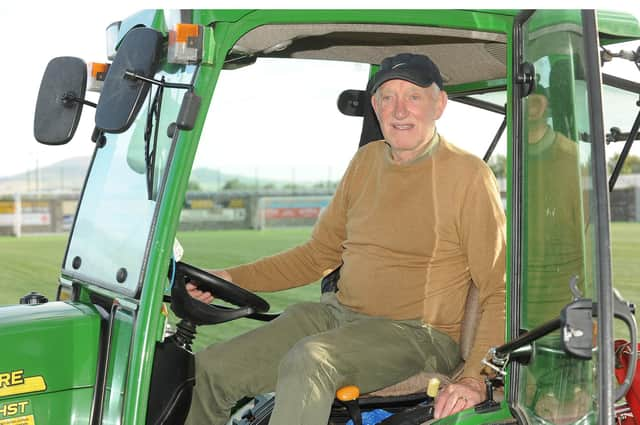

McGarr, who attempted to stop the shots which used to bombard East Fife, is now the groundsman and Harry Waddell and Davie Cumming help him out. The former is known as the “third Waddell” around these parts and although he didn’t represent the Fifers like his brothers Bobby and Andy, he was a player too.
“Forfar Athletic,” Harry tells me. Very good, I say. “And also Juventus.” For a split-second I wonder if I’m interviewing the wrong person, that here at last is the missing link between Loon-town bridies and the Turin Shroud, when Davie says: “He means the Juventus in Australia.”
Advertisement
Hide AdAdvertisement
Hide AdThese three are part of a small army of OAPs who potter around the stadium, keeping it spic and span for the Methil community and the football team. Every now and again one of them will stop to listen as McGarr, sat in the stand with his tea, tells the story of his life, and possibly they’re hoping to hear something new. The yarn which most interests me comes from our man’s time at Aberdeen when, to paraphrase Benny Hill’s chart-topping novelty hit from the same era, his name was Ernie, and he drove the fastest snow-plough in the north. Myths of our football, when you dig a bit, have a habit of turning to slush. I hope this one won’t.
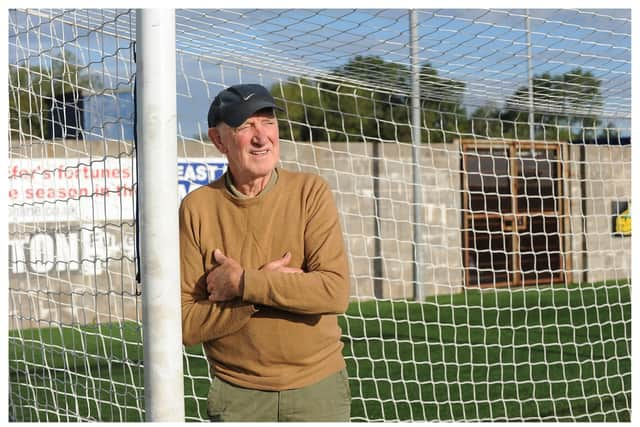

This era celebrated its participants by requesting that they squinted into bright, pre-season sunshine with wild hair flying and stylists absent so the resultant photos could be transferred onto collectable cards which these days turn up on Twitter and prompt much hilarity. Now 78 and no longer in possession of his flyaway strands, McGarr’s national duty was brief but he remains proud of having served.
The 1969 debut against the team he still calls Eire was a friendly as Scotland attempted to qualify for the Mexico World Cup. There were no international breaks back then either – today’s players are such indulged snowflakes in comparison – and all manager Bobby Brown could secure from the SFA as a warm-up for the qualifying group decider was a Sunday afternoon kick-off in Dublin, 24 hours after a full card of league games.
“Unfortunately I got a ‘Charlie horse’ playing for Aberdeen at St Johnstone on the Saturday – a dead leg,” explains McGarr, “but I hid it because I loved being around the Scotland guys at Largs and this was going to be my big chance.”
The team that September afternoon was: McGarr, John Greig, Tommy Gemmell, Billy Bremner, Ronnie McKinnon, Bobby Moncur, Willie Henderson, Pat Stanton, Colin Stein, Peter Cormack and John Hughes.
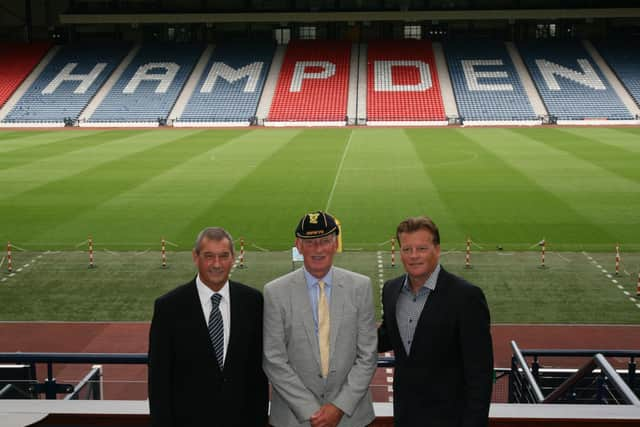

“The thing I remember about Dalymount Park was all the nuns sat round the pitch. They got in free, along with the priests. The physio had worked all night on my leg but not long into the game I made a save and couldn’t get back up. I was angry, hadn’t done myself any favours. Jim Herriot took over.”
Herriot retained his place for the decider – away to West Germany, the game of the notorious boot up Helmut Haller’s backside, administered by Gemmell. “I was upset not to play in that one. Bobby Brown was an ex-goalie but I didn’t really rate him as a manager. I’m pretty sure the likes of Bremner, Gemmell and [Bobby] Murdoch picked the team. These guys were mad for games of cards up the back of the team bus. It was a fiver a time, a lot of money in those days. Bobby would say to [trainer] Tom McNiven: ‘Go tell them to cut that out.’ Tom would go: ‘You tell them.’”
McGarr’s second appearance in the meaningless group game away to Austria would be his last, although he continued to sit on the Scotland bench. The actual caps didn’t come into his possession for another 40 years, when a daft rule about only Home International players of the period receiving them was retrospectively scrapped. They remain his most treasured possessions.
Advertisement
Hide AdAdvertisement
Hide AdGoalkeeping was in the blood. His father, also Ernest, was Carlisle United’s custodian in the 1930s. The Glasgow-born McGarr started out as a centre-half, was two years behind Sir Alex Ferguson at Govan High School, played for the same Harmony Row youth club as Fergie – and only switched to goalie when the regular keeper was unavailable. “Being the tallest at 15, I was nominated. ‘What a terrible job,’ said Dad. But right away I was smitten.”
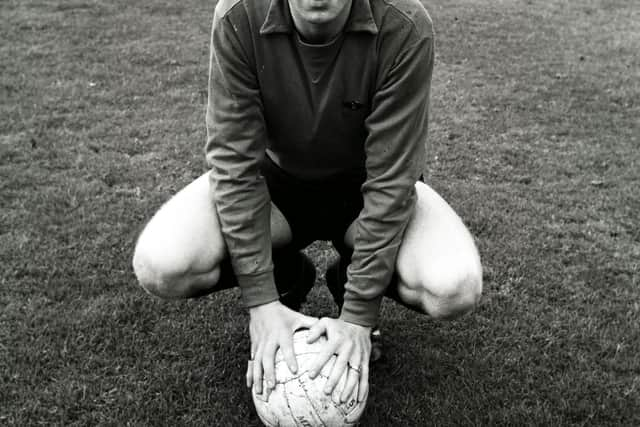

Eddie Turnbull signed him for Aberdeen in 1965. “A visionary,” says McGarr. “Stuff he did with us others would copy later. Tommy McMillan operating as an overlapping full-back was an idea he got from watching rugby. Bobby Clark and myself as the goalies were sent outfield in practice matches. ‘Play starts with you,’ he’d say, ‘so you have to understand everyone’s role.’
“Fantastic manager but an awfie man. Absolutely ruthless. Once we were on a terrible run, in danger of being relegated, lost at home to Clyde and the next match was away to Rangers. The local paper, the Press and Journal, laid into us, as they’d been doing all season, so it became known as the Depressing Journal. The reporter, Jimmy Forbes, used to travel on the team bus and when he tried to get on at [Glasgow’s] Central Station, Eddie, who was standing at the door, said: ‘For that rubbish you wrote the other day you can walk to Ibrox.’”
McGarr would be subject to bollockings, although not as many as Joe Harper. “The wee man, Derek ‘Cut-tie’ McKay and myself used to pal about together – we were known as the Three Degrees. And what a player Joe was. If you were to ask me as a goalie who was the best finisher in Scottish football from my era I’d say it was between Joe Harper, Joe McBride and Bertie Miller when he played for East Fife. One-on-one with keepers they were deadly. Funnily enough, coming from out wide they all did the same thing: near post, high into the net. That took some skill.”
Turnbull was the harbinger for the Dons’ glory years under McGarr’s old school pal Fergie and you wonder how the latter would have handled three quixotic wingers from the years before his revolution. McGarr has fond memories of them all.
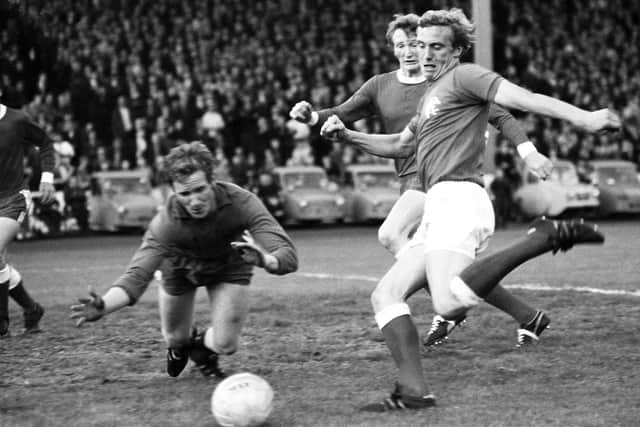

“Charlie Cooke was a diamond. We became friends with Scotland and when we flew into Glasgow after that Eire game he insisted on driving me back to Aberdeen. There was a detour to St Monans so he could say hello to his mum and then he took me home. Actually, not quite. We stayed in a casino until chucking-out time at 3am.
“Then there was Zoltan Varga. How the heck did an Olympic gold medalist, who went on to become [Johan] Cruyff’s replacement at Ajax, end up at Pittodrie? He was a man of mystery. Never took part in a warm-up, just jogged up and down the pitch in front of the man stand. Being from Hungary, his English wasn’t great but he joined in our nonsense. After training, Tommy McMillan, Alex Smith and myself used to have a coffee together and work out our strategy for the day’s horseracing. I can still see Zoltan: ‘I have five of your pounds – you want?’”
Completing the triumvirate is Jimmy Smith: “In the mood he was a magician although I never wanted him trying his nutmegs anywhere near me. Before the [1967] Scottish Cup final the team stayed a week at the Atholl Palace Hotel in Pitlochry. I was rooming with Jimmy and Martin Buchan, way ahead of his time, who liked to play the guitar and was so polite. One night Jimmy burst into the room legless and pissed in the sink. This woke Martin who said: ‘Do you know, Jimmy, you’re very uncouth.’
Advertisement
Hide AdAdvertisement
Hide Ad“Then there was the time Jimmy, who’d disappeared right after a match, came back to Pittodrie on the Monday with a dose of scurvy. He told us later he’d been with some old doll but at the time didn’t say anything and the whole team ended up catching it. Towels and training kit had to be chucked in the incinerator and we had to strip off for the club doctor and these two nurses so they could cover us with this funny pink solution. When your body got hot it tingled something terrible.”
McGarr and Bobby Clark were involved in a fascinating rivalry for the No 1 shirt, the former deposing the latter after six goals had been conceded to Hibernian in the 1968-69 season, the one where Aberdeen teetered over the drop. “I never saw that coming. Bobby was Eddie’s favourite, having had him at Queen’s Park. And then a bizarre thing happened: we ran out of defenders, Davie Robb had to play centre-half for a bit - and then Bobby did. A goalie playing outfield, but Eddie had prepared him for it. And he was pretty good, you know, although that was a very tense season. No one spoke. Until Jimmy’s scurvy. That broke the silence, all right.”
After helping the Dons stay in the old First Division McGarr kept his place until the start of the following campaign’s run to Hampden and Scottish Cup glory. Though competition with Clark was always friendly he was gutted to miss the final. Everyone gets a medal now; not back then. “I reckoned my time at Aberdeen was over. Eddie signed Gerry Neef from Rangers. What a nutter he was. I’ve never seen anyone eat so much. I didn’t rate the guy; he seemed to think Aberdeen were beneath him. But that was me away.”
At Dunfermline Athletic McGarr fell in with another flair guy from the flanks – Alex Edwards. “He had a flat in the south of Spain and one summer, with a wife and kid each, we all squeezed into his VW Beetle. The round trip was 3,000 miles.” McGarr also played for Airdrie, Cowdenbeath and Berwick Rangers but he clocked up the most appearances in his four years at East Fife who were tenacious top-flighters for nearly all of that time.
None more so than when Jock Stein’s all-conquering Celtic came to the old Bayview not far from its replacement on a frozen February afternoon in 1973. “We were the only game in Scotland to survive the bad weather and do you know that ground’s secret? It was only discovered when new houses went up on the site – 14 feet of sand underneath the surface, which explained why our matches were hardly ever off.”
This one has gone into legend for McGarr’s triple penalty-save heroics. First up was Bobby Murdoch. “That one is sometimes not credited to me but I definitely touched it onto the bar.” Then came Harry Hood and finally Kenny Dalglish. “It was one of those days that goalies dream about. Not my greatest game – that would probably be a League Cup tie against Hibs at Easter Road [a no-scoring draw in ’69-’70 shortly before his Scotland debut] – but my concentration was terrific and the ball was scudding off my knee, my shoulder, everywhere. I’m not sure what my strengths as a keeper were. Murdoch once asked me: ‘How do you manage to hang in the air for so long?’ But I was always pretty good at penalties, and the three that day were good stops.”
A match report hailed McGarr as “the best reserve goalkeeper in the world” and quoted East Fife boss Pat Quinn telling reporters: “That was the kind of game to bring back the fans. But, gentlemen, it was also the kind of game which takes ten years off a manager’s life.” It finished 2-2, the Fifers denied a famous victory by a last-gasp Dixie Deans equaliser. “I was gutted about that but afterwards Jock Stein came into our dressing-room and congratulated me, saying I deserved to get back in the Scotland team. That made me quite emotional.”
This didn’t quite happen and McGarr wound down his career in the junior leagues, including at Oakley United alongside ex-Celt George Connelly, but there is one more tale I need to hear, his version of events when the Three Degrees hi-jacked that snow-plough.
Advertisement
Hide AdAdvertisement
Hide AdIt’s held up as a prime example of drunken footballer malarkey, McGarr, Harper and McKay emerging from a pub from an afternoon’s drinking following a postponement, spotting the vehicle and taking it for a spin along Aberdeen’s Union Street.
This was Harper’s recollection when I met him a few years back. Not quite true, according to McGarr: “When the game was called off Eddie told us we could have a few bevvies, only not in the city. ‘Go to Stonehaven,’ he said. We ignored that and I think we must have ended up in Peep Peeps, a favourite of the players where you were greeted at the door by a daft skeleton.
“It snowed all day and by the time we’d had our fill Joe’s car was completely covered. This jalopy – it wasn’t a proper snow-plough but it had a shovel and was used to tow buses when they got stuck – was sitting there with the engine running and no one around.
“It was an AEC, eight wheels, and I knew how to drive it because I’d been a time-served motor mechanic. Joe and Derek chucked sand on the road as we chugged along. We hitched up to Joe’s car and managed to haul it out. There was a definite purpose to what we did. Let’s just say I borrowed the vehicle. I did drive it quite a long way, but quite slowly because I was quite merry, and then put it back where I found it.”
There’s ironic applause from the volunteers as everyone gets back to work. McGarr starts up his tractor and says: “Oh dear, I hope I haven’t ruined that story for you.” Don’t worry, Ernie, you haven’t.
Comments
Want to join the conversation? Please or to comment on this article.